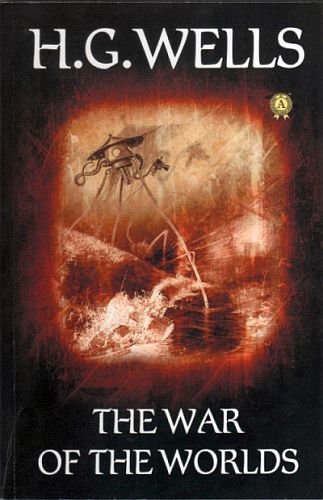 tek's rating:
tek's rating: 


The War of the Worlds, by H.G. Wells (pub. 1898)
Amazon; B&N; Goodreads; isfdb; Literature Network; PenguinRandomHouse; Scholastic; StoryGraph; TV Tropes; Wikia; Wikipedia
This came out about 77 years before I was born, so it's something I've known about for as long as I can remember. It was famously adapted for radio in 1938, and a movie in 1953 (which I don't think I've seen, but I should), and another movie in 2005, and probably any number of other things. And of course it is one of the earliest works of science fiction (before that term even existed), so it's surely had a profound influence on the genre. I feel like I might have had a copy of the book when I was a kid, but I don't think I ever read it, and if I did have it, I don't anymore. I finally ordered a new copy online, which I began reading in October 2018. (The copy I got is the size of a graphic novel, which I wasn't expecting. But it has no graphics in it. I hope it's unabridged, but I couldn't say for sure.) Unfortunately, after October I fell out of the habit of reading it for months, and didn't finish it until February 2019. And now I'm starting this review in April, because I'm such a procrastinator. So I suppose I've forgotten plenty of details, and I don't recall whether I had anything specific I wanted to say about the book, at any point in my reading. Sigh.
But then again, I'm not sure how much I would have been able to say if I did remember every detail of the story. It is told by an unnamed narrator, who witnessed bits and pieces of a Martian invasion of Earth, in the early 20th century. I guess he's writing about this experience some years after it happened, so throughout the narrative, he occasionally provides information about the Martians and their machines that neither he nor anyone else knew at the time of the invasion, but only learned later. Anyway... it seems the Martians had fired cylinders out of a giant gun, or whatever, pointed at Earth. Eventually the cylinders crash in various locations around England, open up, and Martians emerge, and begin building various machines. The main type are tripod vehicles with heat-rays. It takes awhile for them to start causing any trouble, but when they do, panic ensues. Humanity achieves maybe a couple of minor victories, but mostly the Martians destroy whole towns and cities, and kill countless people, while others flee in droves. Early on, the narrator took his wife to stay with relatives, and then returned home by himself. But he later began traveling from place to place, witnessing all the destruction caused by the Martians (sometimes while it's happening, sometimes just the aftermath). And throughout the story, he occasionally meets other people, most of them unnamed, who each have their own reactions to the invasion. But in the end, the Martians all die... not through any effort of humanity, but in case you don't know what killed them, I won't explain it.
And... I really don't know what else to say. It's certainly a well-written book, and it has some interesting ideas. I'd say a lot of the descriptions the narrator provides of... well, everything... seemed kind of dry, to me. He seems more interested in a scholarly analysis of the Martians than in telling a thrilling story, though it's probable that I'm simply biased by living in a time with all sorts of movies and TV shows, and having more than a century of science fiction that came after Wells. I expect his story was quite thrilling to readers in his own time. Anyway, I definitely liked it, even if I couldn't get particularly excited about very much of it.